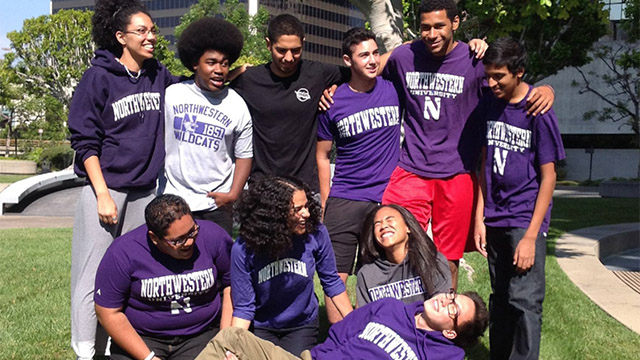From its humble beginnings in 2012 as an office of one, Campus Inclusion and Community (CIC) has grown quickly, and recently celebrated five years at Northwestern.
That "one" was Lesley-Ann Brown-Henderson, CIC’s executive director.
"Since the beginning, we've worked hand in hand with Northwestern students who asked for a University-led effort at creating a more equitable and just campus culture," she said.
In five years, CIC has expanded to include more than 15 staff members. The team is focused on developing relationships with students, faculty and staff to transform the student experience through signature programs and services.
Related: Read the Campus Inclusion and Community strategic plan 2016-2022
Made up of three departments — Multicultural Student Affairs, Student Enrichment Services and Social Justice Education — CIC has launched several key initiatives, including identity-based congratulatory programs, such as The JOY and Lavender, which take place before Commencement, as well as the Compass Peer Mentoring program and the Sustained Dialogue program..
Stronger and more mature
Jazzy Johnson, a 2013 Northwestern graduate, was a student activist and founder of Sustained Dialogue. She was so instrumental in the creation of CIC that it established an award in her name.
"I experience Northwestern as a body, a community, that is stronger, more mature and more confident, with healthy practices of caring for itself, especially when it falls down, because of the work of CIC," she said.

CIC also oversees the Northwestern Posse Scholars Program, which graduated its first cohort last year. Posse is one of the most renowned college access and youth leadership development programs in the U.S., with chapters in 10 cities.
Looking forward with a vision to champion a campus culture where all students thrive, CIC has identified four strategic goals:
- Enrich the Northwestern narrative: Validate the stories of Northwestern students by remembering the experiences of those who came before them, creating spaces and opportunities for them to tell their stories.
- Cultivate community: Enable students to build meaningful relationships with those who are like and unlike them. Integrate collective leadership and justice into the fabric of the campus community and empower students to find multiple spaces they can call their own.
- Enhance access to resources: Raise awareness of resources and remove academic, financial and psychosocial barriers to ensure students’ fundamental needs are met.
- Raise critical consciousness: Create opportunities for students to learn about themselves within their physical, social and historical contexts.
Sense of community
Kimani Isaac is a sophomore in the School of Communication. She came to Northwestern because she planned to explore theatre as a way to encourage social justice. Now, she’s working across campus with identity- and culture-based groups to aid in their mutual struggles.
Isaac credits the Summer Academic Workshop (SAW) with helping her feel more connected to Northwestern and its student resources. And that’s how she found CIC.
“I've received love and support from CIC,” she said. “The staff made me feel a sense of community, and that's a new thing for me. I've achieved new levels of personal growth at Northwestern because I've been lucky to meet people who genuinely care and want me to do well.”
Learn more about Campus Inclusion and Community by visiting the department online.


